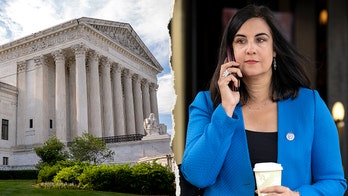Biden's criticism of Trump's vaccine plan 'complete fiction': Gerry Baker
WSJ Editor-at-Large Gerry Baker pushes back after President Biden says the Trump administration did not have enough COVID-19 vaccines planned for every American adult.
President Biden on Wednesday said he is "optimistic" about bipartisan work to make "significant strides" in advancing cancer research -- and expressed hope that he could be the "president to preside over the end of cancer as we know it."
The comments came as Biden and Vice President Harris hosted a group of Republican and Democratic members of Congress in the Oval Office on Wednesday afternoon.
The White House said the group of lawmakers were "pivotal" in passing the 21st Century Cares Act during the Obama-Biden administration, which was designed to help accelerate medical product development and bring new innovations and advances to patients who need them faster and more efficiently.
BIDEN SAYS ONCE HE DEFEATS COVID, CANCER IS NEXT
Biden, at the start of the meeting, introduced the members of Congress, saying they "all have an extremely keen interest in doing what what I said once before, that I'd love to be the president to preside over the end of cancer as we know it."
Biden said that the lawmakers were "critical in the CARES Act," the first coronavirus relief package, in allocating "about $9 billion to the NIH to deal with cancer and cancer research."
Democrat Sens. Patty Murray of Washington, Dick Durbin of Illinois, Chris Van Hollen of Maryland, Republican Sens. Roy Blunt of Missouri and Mike Crapo of Idaho joined the president and vice president in the Oval Office, along with Reps. Diana DeGette, D-Co., Anna Eshoo, D-Calif., Fred Upton, R-Mich., and Brett Guthrie, R-Ky.
"The vice president and I are of the view that we can make significant strides in fighting cancer and Alzheimer's and other diseases if we take a slightly different approach," Biden said.
"And what I want to talk about today is how we go about taking advantage of the work they've done to get us where we are today," Biden continued. "Because I think we're on the cusp of some real breakthroughs across the board on cancer."
"Cancer is personal to almost everybody," Biden said. "It is probably the one word that is the most frightening word in the English language to people when they hear that C word, cancer, it's it is it is just devastating."
CLICK HERE TO GET THE FOX NEWS APP
"But there's so much hope," Biden continued. "That's what I want to talk about with these folks, about what we do from a legislative and substantive point of view to make the kind of inroads I think we can make."
He added: "I'm optimistic we're going to get something done here."
White House press secretary Jen Psaki, ahead of the meeting on Wednesday, said "defeating cancer is of significant personal importance to the president, the first lady and the vice president."
"This is his first engagement with members of Congress in the Oval Office about it," Psaki said, noting he plans to discuss ways to work with lawmakers on both sides of the aisle.
Last month, Biden said that once the U.S. beats the coronavirus pandemic, "we're gonna do everything we can to end cancer as we know it."
Biden was in charge of President Obama's "Cancer Moonshot" initiative launched in 2016 to double the rate of progress and advances in cancer prevention, diagnosis and treatment.
Biden lost his son, Beau Biden, 46, to brain cancer in 2015.
According to the National Cancer Institute, the Cancer Moonshot had three "ambitious goals": "To accelerate scientific discovery in cancer, foster greater collaboration, and improve the sharing of data."
At the end of the Obama administration, Biden put out an executive summary highlighting the task force's progress, which included establishing a National Institutes of Health public-private partnership for accelerating cancer therapies, making clinical research trials more accessible to cancer patients, studying types of technologies and therapies that could deliver more targeted doses of radiation to tumor cells, and more.
Congress, in December 2016, passed the 21st Century Cures Act, which authorized $1.8 billion in funding for the Cancer Moonshot over seven years. The funding was appropriated each fiscal year, with $300 million in 2017, $300 million in 2018, $400 million in 2019, and $195 million for fiscal year 2020.
It is unclear, at this point, whether the Biden White House will establish a task force similar to the Cancer Moonshot Task Force of the Obama administration.
A White House official did not immediately respond to Fox News' request for comment.
Last month, Biden touted his nomination of Eric Lander as presidential science advisor and director of science and technology policy, a Cabinet-level assignment. Biden praised Lander, saying he will bring together the country's top scientists to conduct advanced research on cancer and other diseases.
"This administration is going to be guided by science to save lives and to make life better," Biden said last month.
















































